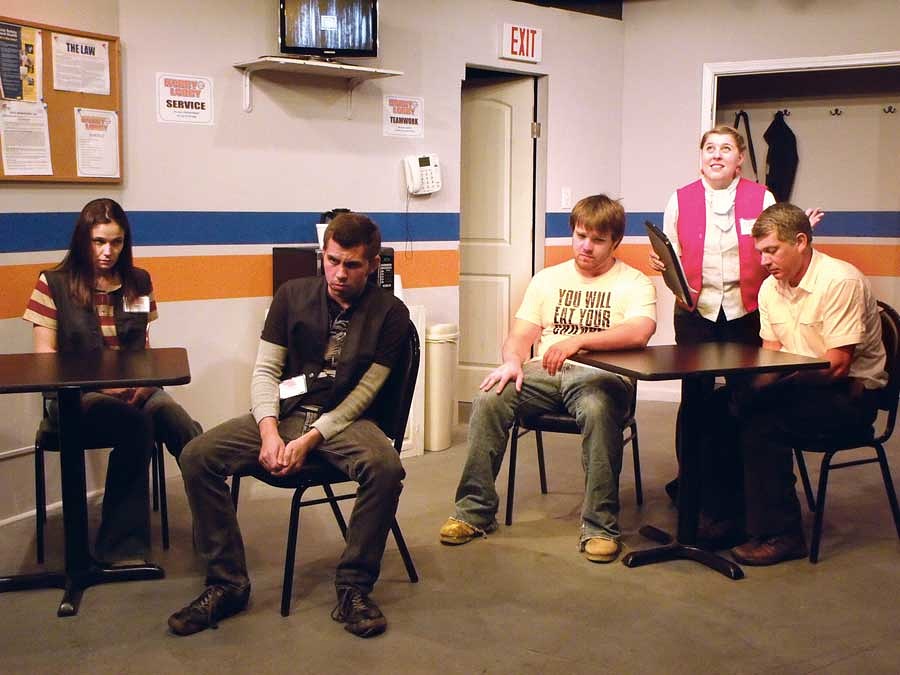
But Louisville’s first taste of Samuel D. Hunter wasn’t at Actors. Rather, A Bright New Boise made its Louisville premiere in a small, 60-seat room in the upstairs of a neighborhood restaurant called The Bard’s Town. The restaurant’s owner Doug Schutte is a playwright/actor/director who cooks a mean fish taco (not to mention the menu of Shakespearean-themed pub grub—try the Corn-delia cakes). In fact, he’s often whipping off his kitchen apron minutes before show time to sprint upstairs and give the curtain speech.
Five years ago, Schutte, now 39, knew he wanted to step back from teaching at a local prep school and open his own theatre with his longtime collaborator Scot K. Atkinson. But he also knew they didn’t want to go broke. How to manage that? By selling gourmet burgers and pouring bourbon—a lot of bourbon. Atkinson tends bar; Schutte cooks. They both direct and act. Most of the regular performers in their productions also pull restaurant shifts. It works. Now in its fourth season, The Bard’s Town Theatre (it’s incorporated separately from the restaurant as a nonprofit) has staged plays by Gina Gionfriddo, Jonathan Marc Sherman, Neil LaBute and William Missouri Downs.
But it was the production of Hunter’s Boise two years ago that helped Schutte and his cohort figure out what kind of theatre they really wanted to produce—smart, tightly written plays that focus on intriguing characters and relationships. Being able to build the kind of working life he wanted is what keeps Schutte from being drawn away by jobs in London or New York, and he’s grateful for it.
“This town has a tendency to put its claws into people,” he says. “If they come here, they tend to stick around.
“There is a lot of opportunity,” he adds. “What can be frustrating is that it’s not necessarily something you can do as your full-time endeavor and make a living at it.”
So he’s had to hustle. But slowly, the dream of owning a pub that supports a theatre is coming true. While Schutte says he hasn’t seen his own financial investment back yet, the restaurant should be free of its business loans in a matter of months.
That means more stability, not only for The Bard’s Town, but for others, too. Most Louisville companies don’t have their own spaces. They move around a variety of smaller rental theatres—Schutte, for one, shares his stage with about a dozen producers. Rather than charge fees, The Bard’s Town takes a cut of ticket sales, which Schutte says keeps him invested in promoting other people’s work.
And those new companies keep coming. Since The Bard’s Town launched, Louisville has birthed Eve Theatre Company, which focuses on women’s stories; Baby Horse Theatre Group, which conducts wild audience experiments; Marrow Street, whose producers like offbeat, garage-corner venues; Think Tank, a Le Petomane spin-off, and more. Two companies now produce solely in Spanish.
Louisville’s embrace of collaboration and cross-promotion also gave rise to a new feature of the Kentucky Shakespeare summer festival. The community-partners repertory, a Shakespearean version of Chicago’s Steppenwolf Theatre Garage Rep program, now closes out the summer season. The festival opens its stage, with all the technical and marketing support that involves, to smaller companies producing their own spins on the Bard. Savage Rose and Le Petomane were part of last summer’s program, and Theatre [502] and The Bard’s Town will participate next summer. “The audience of one given performance at the festival can equal the entire run of a show at our theatre,” says Schutte.
In this model, the big guys give the little guys an invaluable profile boost, which everyone hopes will translate into larger audiences following them from Shakespeare in the Park back home to their regular seasons.
It’s that kind of bold leadership that impressed Teresa Willis, the co-founder of Slant, who produces the event alongside Huff. When she returned to Louisville from living and working in Los Angeles, Willis says she was taken aback by the range and depth of the talent working in her native city.
“We have several excellent writers and a few visionary producers and directors, and the Louisville talent pool has the chops to follow wherever they lead. But lead they must,” says Willis. “I’d like to see more leaning in to risk, more daring failures, more offbeat successes. “
As [502] plans for its season finale in February—Anne Washburn’s postapocalyptic “Simpsons”-flavored play with music Mr. Burns, a post-electric play—the Attaway-Brooks-Reyes team reflects on their path so far and their plans for the future. Operating on revenues of about $41,000 this year, the three are proud of what they’ve carved out for themselves so far, but know they still have much work to do (and money to raise) to realize the company’s potential. They’re still contending with how to tackle those next steps—a stage of their own, livable salaries, and a real seat at the table with the community’s more established arts institutions.
“We’re right on the cusp of something,” says Attaway. “We could stay at this level for the foreseeable future. But I don’t think the three of us want that. We want to keep growing.”
Erin Keane is an arts critic and reporter based in Louisville.


